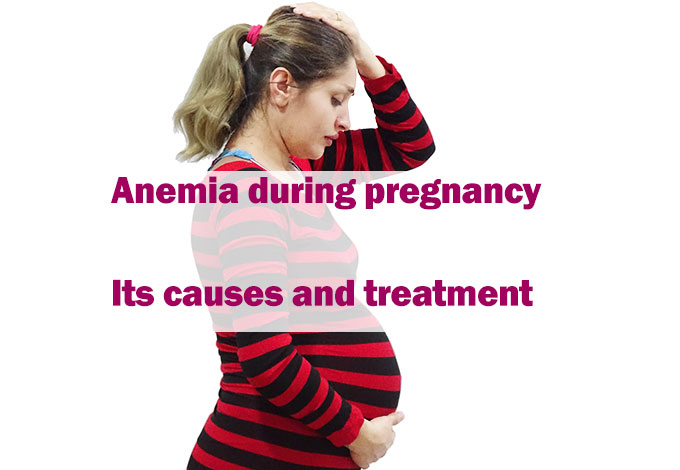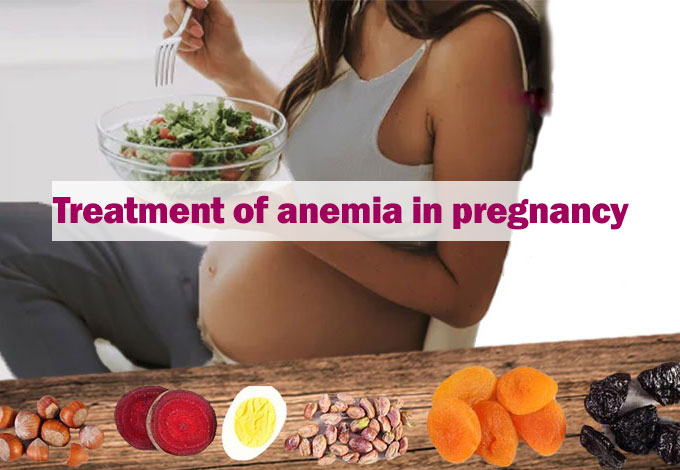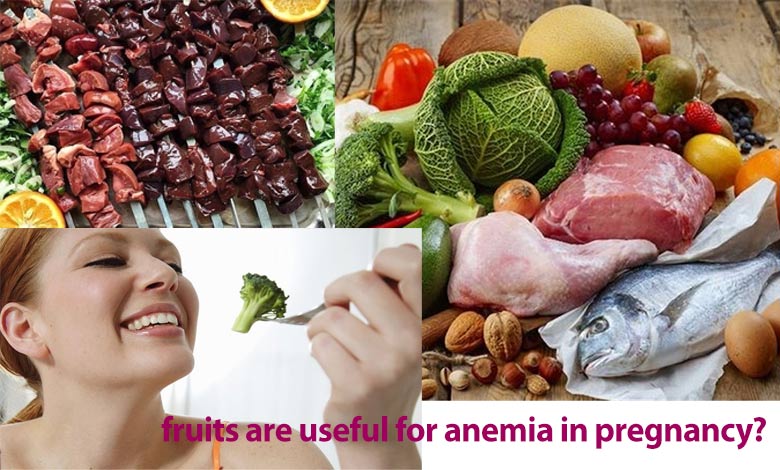Anemia during pregnancy; Its causes and treatment

Anemia during pregnancy is one of the most common problems that pregnant women face, which must be taken care of to maintain the health of the mother and fetus. In this article, we explain the causes of anemia during pregnancy and medicines and home remedies for its treatment. In this article, we read:
What causes anemia during pregnancy?
What is the treatment for iron deficiency?
Is anemia dangerous during pregnancy?
What should you eat for anemia during pregnancy?
Related article: Flowing of the Foot in pregnancy causes, and treatment methods
Anemia during pregnancy
During pregnancy, the body is in a new state that requires special care. The mother’s body needs more iron to nourish the fetus. Iron is one of the main components of hemoglobin, the protein of red blood cells in the body. Red blood cells are responsible for transporting oxygen from the lungs to other parts of the body. For many mothers, it happens that during pregnancy they face iron deficiency and therefore anemia.
Mild anemia is common during pregnancy because the iron stored in most women’s bodies is not enough to spend the pregnancy period, especially in the second and third months or the seventh month onwards. But severe anemia is dangerous for the fetus and the mother and should be taken seriously.
Symptoms of anemia during pregnancy
If anemia occurs during pregnancy, the following symptoms are seen in the mother:
- Premature fatigue
- Weakness and fatigue
- Dizziness
- Facial pallor
- Heart palpitations all the time
- Cold hands and feet
- Heartache
It should be noted that mild anemia can occur without clinical symptoms, or normal pregnancy symptoms, similar to symptoms of anemia, occur. For this reason, regardless of the presence of symptoms, a pregnant person should have a blood test and see a doctor who specializes in anemia.
Complications of pregnancy anemia
Severe anemia during pregnancy should be taken seriously because it threatens the health of both the mother and the fetus. Anemia during pregnancy leads to serious problems, including:
- Higher probability of infant mortality
- Higher chance of premature
- The possibility of incomplete fetal development and low birth weight
- Higher risk of maternal death due to bleeding
- Higher likelihood of postpartum depression
Anemia during pregnancy and fetal sex
We mentioned above that the anemia of the mother has a negative effect on the health of the fetus. But when it comes to determining the sex of the fetus, anemia cannot be considered as an effective factor.
In general, although it is believed that the sex of the fetus can be determined by eating certain foods before or during pregnancy, this idea has no scientific basis.
The determination of the sex of the fetus affects other factors beyond the control of the parents and, in some ways, it can be said that it is determined by chance. The only thing a mother should pay attention to is the health of the fetus and herself.
For more information on anemia in pregnancy, please read this article till the end.
Treatment of anemia in pregnancy
Medical care should be taken from the beginning of pregnancy to control possible anemia. After conducting tests and checking the level of hematocrit and hemoglobin in the blood, a doctor can prescribe an oral iron supplement. The type of iron supplement and its dosage are determined by the doctor in proportion to the severity of anemia.
For more absorption, it is recommended to take iron supplements on an empty stomach with orange juice. Because vitamin C found in citrus fruits helps in better absorption of iron.
But iron supplements should not be taken with milk or coffee. Because milk calcium, although useful for pregnant women, interferes with iron absorption. Caffeine in coffee is also harmful during pregnancy and is an obstacle to iron absorption.

In most cases, taking iron supplements according to the doctor’s opinion is the definitive treatment for anemia in pregnancy. Usually, after a period of taking iron supplements, the blood iron level increases, and the problem is solved. But this issue needs to be checked by a doctor.
Be careful not to take iron supplements on your own, because too much iron damages the digestive system.
Sometimes, due to blood disorders, pregnancy anemia may not be resolved by taking iron supplements. In this case, you should consult a hematologist or a hemolytic anemia doctor (specialist in blood disorders).
Anemia ampoule in pregnancy
Iron supplements can also be administered intravenously. Some people have stomach problems when taking iron tablets orally due to gastric bypass surgery or other digestive restrictions. In this case, the doctor prescribes an iron injection for the patient through the serum.
Home treatment of anemia during pregnancy
Taking vitamins and having a diet rich in iron is very effective in eliminating or preventing pregnancy anemia. Iron is found in animal meats in large quantities, for this reason, the consumption of red meat, fish meat, and chicken is recommended.
Some plant foods also contain iron and should be included in the diet including legumes such as peas, beans, and lentils.
What fruits are useful for anemia in pregnancy?
Eating fruits such as bananas, dates, apricots, figs, and vegetables such as broccoli, beets, and potatoes are useful for anemia during pregnancy.
At breakfast, the consumption of oats, cereals, and bran bread helps to increase the immunity of a pregnant woman and the level of iron in the blood.

By having a healthy diet rich in iron, you can quickly treat anemia in pregnancy and treat anemia in pregnancy in traditional medicine.
What effect does iron deficiency anemia have on the fetus during pregnancy?
- Severe anemia during pregnancy increases the risk of premature birth, low birth weight, and postpartum depression. Some studies also show an increased risk of infant death immediately before or after birth.
- Prenatal vitamins usually contain iron. Taking prenatal vitamins containing iron can help prevent and treat anemia caused by iron deficiency during pregnancy. In some cases, your healthcare provider may recommend a separate iron supplement. During pregnancy, you need 27 mg of iron daily.
- Good nutrition can also prevent iron deficiency anemia during pregnancy. Food sources of iron include lean red meat, poultry, and fish. Other options include iron-fortified breakfast cereals, plum juice, dried beans, and chickpeas.
- To increase the absorption of iron from plant sources and supplements, combine them with a food or drink containing vitamin C, such as orange juice, tomato juice, or strawberry juice. If you take iron supplements with orange juice, avoid calcium-fortified varieties. Although calcium is an essential nutrient during pregnancy, calcium can reduce iron absorption.
How to prevent and treat iron deficiency anemia during pregnancy?
- If you take iron supplements during pregnancy and develop anemia, your doctor may recommend tests to rule out other possible causes.
- In some cases, you may need to see a hematologist. If iron deficiency is diagnosed, it is recommended that you take more iron supplements from your doctor.
- If you’ve had surgery on your stomach or small intestine, or if your body can’t absorb iron from food, you may need iron in your intestines. These prenatal vitamins usually contain iron.
- Taking prenatal vitamins with iron can help prevent and treat iron deficiency anemia during pregnancy. During pregnancy, you need 27 mg of iron per day.
- A healthy diet can prevent iron deficiency anemia during pregnancy. Foods high in iron include red meat, poultry, and fish. Other options include iron-fortified breakfast cereals, freshly squeezed juices, dried beans, and chickpeas.
- Iron from animal products like meat is readily available. In addition, to increase the absorption of iron and plant supplements, it is recommended to combine them with foods or drinks that contain vitamin C, such as orange juice, tomato juice, or strawberries.
- If you take iron supplements with orange juice, avoid drinks that contain calcium. Although calcium is an essential nutrient during pregnancy, it can reduce iron absorption.
When should a doctor be contacted?
If symptoms of anemia occur in a pregnant woman, she will go to a specialist doctor. In this article, we have explained the causes, symptoms, and complications of anemia during pregnancy. We hope this article is useful for you.
